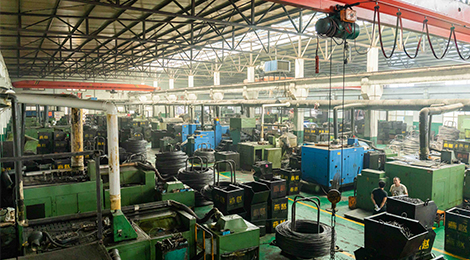Manufacturers of Metric Hex Bolts and Fasteners in the Industry
Nov . 08, 2024 14:16 Back to list
Manufacturers of Metric Hex Bolts and Fasteners in the Industry
Understanding Metric Hex Bolts An Essential Component in Modern Manufacturing
In today's manufacturing landscape, precision and reliability are paramount. Among the myriad components that ensure structural integrity and functionality in machinery and construction, metric hex bolts stand out as critical elements. These fasteners not only provide strength but also maintain the alignment and integrity of assembled parts. This article delves into the significance of metric hex bolts, the factories that produce them, and their applications across various industries.
What Are Metric Hex Bolts?
Metric hex bolts are fasteners characterized by their hexagonal heads and smooth shanks. Designed to be used with a compatible nut or in a pre-tapped hole, they are primarily sourced and manufactured according to the metric system. This system is internationally recognized and offers standardized sizes, making it easier for engineers and manufacturers to select the appropriate fasteners for specific applications.
One of the key advantages of metric hex bolts is their ability to provide a strong clamping force. When tightened, the bolt's design allows for the even distribution of load across the assembled parts, preventing them from shifting or loosening over time. This quality is invaluable in high-stakes environments, such as aerospace, automotive, and construction.
Factories Producing Metric Hex Bolts
The production of metric hex bolts is a highly specialized process carried out in factories equipped with advanced machinery. These facilities employ state-of-the-art technology, including CNC machines and precision forging equipment, to produce bolts that meet international quality standards.
Manufacturers typically begin the production process by sourcing high-grade raw materials, such as carbon steel, stainless steel, or alloy steel. The choice of material can significantly affect the performance and durability of the final product. For instance, stainless steel bolts are highly resistant to corrosion and are preferred for applications in moist or saline environments.
metric hex bolts factories

Once the metals are sourced, they undergo forging or machining. Forged bolts are created by shaping heated metal under immense pressure, resulting in a denser and generally stronger product. On the other hand, machined bolts start as solid bars that are cut and shaped to specifications. Both methods have their merits, and the choice between them often depends on the required durability and volume of production.
Quality control is vital in factories that manufacture metric hex bolts. Rigorous testing, including tensile strength and fatigue tests, ensures that each bolt meets the required specifications. This commitment to quality is what gives manufacturers a competitive edge, as engineers are more likely to trust products that adhere to strict standards.
Applications of Metric Hex Bolts
Metric hex bolts are integral to various industries. In construction, they play a crucial role in assembling steel frameworks for buildings, bridges, and other infrastructure. Their ability to withstand heavy loads while maintaining structural integrity makes them indispensable.
In the automotive industry, metric hex bolts secure essential components, from engines to chassis. Given the rigorous safety standards of this sector, the reliability of these fasteners is critical. Engineers specify precise torque values to ensure that each bolt is sufficiently tightened, which is where the proper selection and quality of metric hex bolts come into play.
Manufacturing also heavily relies on these fasteners. From machinery assembly to conveyor systems, the efficiency of operations often hinges on the performance of metric hex bolts. Their versatility makes them suitable for a wide range of applications, from small gadgets to large industrial machinery.
Conclusion
In conclusion, metric hex bolts are a cornerstone of modern manufacturing and construction. The factories that produce these essential components utilize advanced technology and strict quality control measures to ensure their reliability and performance. As industries continue to evolve, the importance of high-quality fasteners like metric hex bolts will remain a constant, underpinning the structural integrity and safety of countless applications. Whether in the depths of machinery or the heights of a skyscraper, these humble yet mighty components play an unseen but vital role in our engineered world.
Latest news
-
Top Wire Bolts Suppliers | AI-Optimized Fast Delivery
NewsAug.02,2025
-
Top Metric Wood Screw Companies | Durable & Reliable
NewsAug.01,2025
-
Premium Lawn Mower Handle Bolts Supplier | Fast Delivery
NewsJul.31,2025
-
Premium Silver Screws Supplier | High-Conductivity Fasteners
NewsJul.31,2025
-
Silver Screws Supplier: High-Quality Fasteners for Various Industries
NewsJul.30,2025
-
Top Spike Wheel Nuts Supplier - High Quality & Custom Options Available
NewsJul.29,2025
